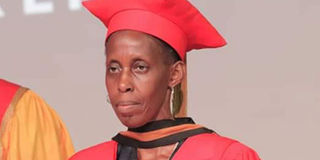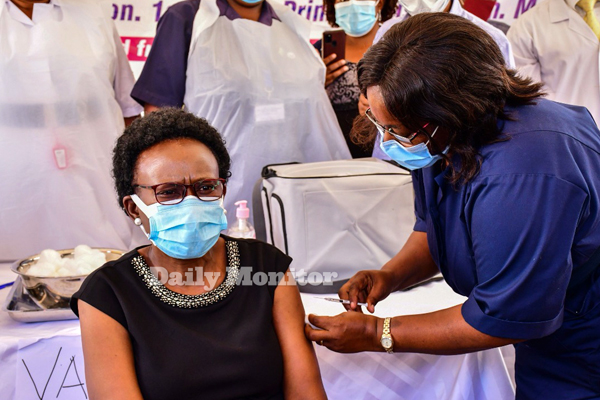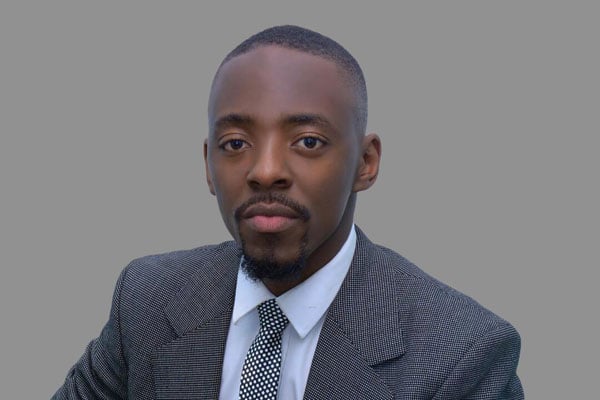Prime
Uganda’s Covid-19 battle hit by ‘misinformation pandemic’

Health workers attend to a patient in the ICU section of Mulago National Referral Hospital last month, during the coronavirus pandemic outbreak in Uganda. PHOTO/FILE
What you need to know:
- Apart from wrong information that has been spreading, government agencies have been seen struggling to counteract and debunk apparent propaganda on social media.
- Even with no proof, syndicates of Ugandans barrage and accuse local media houses of ganging with ‘government mafias’ to scaremonger and blow-out propaganda.
- Prof Chibita attributes Uganda’s ‘real pandemic’ masked in hoax claims and conspiracy theories to shattered trust.
On a major radio station in oil rich Hoima City in the Albertine graben --during a sought-after ‘Press review’ programme, celebrated journalist Fredrick Akiiki Omuhamba had a statement to make during a live broadcast.
“I’ve been watching things on social media that [we] people who got vaccinated [against Covid-19] are going to die after two years,” he said. This was on May 31.
Mr Omuhamba who was transmitting at around 9:40am on one of mid-western region’s most listened to radio stations, 89.0 Liberty FM- distressingly and in an alarming tone stated, “We’re finished.”
After what he heard on radio that day, Emmanuel Muvunyi, 27, has vowed never to take the jab.
“They’re injecting people with the virus. No wonder, our cases have rapidly increased since vaccination started,” he said.
Around that time, Uganda was littered with a wider spectrum of dangerous new variants causing a 150% spike in fresh infections, and fatalities.

Mr Fredrick Akiiki Omuhamba Kusiima is a popular news anchor in Uganda's Sub-Western region. PHOTO/COURTESY
Even with no proof, syndicates of Ugandans barrage and accuse local media houses of ganging with ‘government mafias’ to scaremonger and blow-out propaganda.
“Uganda’s Corona is a scam and it only benefits your corrupt oligarchs. The case here is different and our country hasn’t tasted real Covid-19,” Charles Mayanja, a Ugandan based in Dubai, reacted to a news-story on NTV Uganda.
Countless religious dogmatists also held firm to theories advanced in worship places - especially to accord micro scale attention to science as they say, the disease will just vanish.
”Covid-19 is like any other disease but of course exaggerated. Just pray and one day it will cease,’’ City Banker Amandah Kisakye, 27, says.
Apart from wrong information that has been spreading, government agencies have been seen struggling to counteract and debunk apparent propaganda on social media.
“It is not true that all health facilities in Kampala have run out of Covid-19 vaccine,” the ministry wrote in response to Conrad Nkutu’s tweet that said: “‘Confirmed by the ministry of health: All the hospitals in Kampala have run out of the vaccine.”

A casket pinned with posters calling for the resignation of Ministry of Health PS Diana Atwine (inset) over alleged poor handling of Covid-19 was dropped in the middle of the road to Mulago Women's Specialized Hospital in Kampala on July 26, 2021. PHOTO/ABUBAKER LUBOWA
Huge impact
A look into the impacts of misinformation and conspiracy theories indicates that they create adherents in a spiralled manner.
“The potential negative impact of disinformation and fake news is multiplied by your reach,” said Prof Monica Chibita, a communication scholar and lecturer at Uganda Christian University (UCU).
She further stresses the undesirable outcome information outlets may cause.
“Unfortunately, the people who are most dependent on radio in Uganda are the ones who probably don’t have the sophistication to filter and discern whether information is accurate,” Prof Chibita remarked during an interview.
“It’s difficult to retrieve what people have received. We must assume that there’s a potential huge impact on the population,” she added.
How did we get here?
Prof Chibita attributes Uganda’s ‘real pandemic’ masked in hoax claims and conspiracy theories to shattered trust.
“Citizens may go a layer behind the media and not trust the sources of information such as government officials, religious leaders,” she said.

Prof Monica Chibita. PHOTO/FILE/COURTESY
“Absence of trust endangers believing information and its source,” she further noted on Uganda's Covid-19 battle that was during its first wave splattered with cash theft scandals involving government officials.
Shaping wrong agenda
Meanwhile, a quick probe by Daily Monitor finds anecdotal evidence that there are hundreds of fake accounts run on microblogging platforms like Facebook and Twitter.
“The problem is that they set a wrong agenda and shape or drag public debate towards a peculiar direction,” said digital specialist Mr Bright Mukisa.
Their hoax and conspiracy claims incite what Mr Mukisa describes as waywardness and civil disobedience towards restrictions, policies, SOPs and medical considerations.
It will be very bad
From India, elsewhere and to Uganda, mainstream media, microblogging and social networking sites are flooded with stories and images of Covid-19 related fatalities or survivors.
For 25-year-old Mr Innocent Vuga who suffered from the disease during the prevalent second wave, that’s the ultimate way to “spread the light to those who think it’s a hoax.”

Ambulances line up outside Kampala Capital City Authority mortuary in Mulago on June 16. Over 17 Covid-19 patients died on the night of June 15 after an oxygen supply system failure at Mulago National Referral Hospital as the country also struggled with an Oxygen crisis. PHOTO/MICHEAL KAKUMIRIZI
. PHOTO/MICHAEL KAKUMIRIZI
In another case, three of Uganda’s known 2,800 Covid-19 fatalities (as of August 10) have occurred in Mr John Musiime’s family, forcing an attitudinal change.
“My wife and I are seated at the balcony mourning. And then, the ceaseless sounds of the ambulance sirens tearing through,” he wrote on Twitter in early June eulogizing his relatives and friends that had succumbed to the contagion.
Like the patient-outnumbered medical workers in a stretched health system falling short of medical supplies with nearly 600 bed-bound Covid-19 victims, Mr Musiime “fears that the unmitigated disaster is going to be very bad.”
Herbs vs scientific treatment
The predominant misinformation that also exists through hoax and conspiracy claims recently got flavoured with texts and audio visuals in circulation- suggesting herbal steaming-concoctions as the ideal treatment for Covid-19 but the World Health Organization (WHO) differs.
“It does not cure Covid-19 and it’s not a safe treatment as it may cause serious burns. No matter how hot the steam is, it will not reach the virus present in the cells of the infected individual,” WHO warns.
‘Paired treatment’
However, while WHO discourages the use of items that are not recommended by medical personnel, many attest to some of these herbs and concoctions from various plants helping relieve some of the symptoms.
Discharged from the Namboole stadium Covid-19 treatment centre amongst Uganda’s 87, 700 recoveries, Dr Paul Kasigaire late July said: ‘’My treatment comprised of counselling, oxygen support, Zinc, Vitamin C and Azathioprine. ‘’
“The medication may be different if someone has other underlying health conditions like diabetes and pressure,” he noted.
However, Dr Kasigaire admitted that he’d also relied on the often touted mixture of garlic, lemon and hot substances as a Covid-19 remedy.
“Pairing of scientific and herbal…I think both are important as I was told to embrace both. Taking prescribed medicine helped me recover in just over 10 days but I supplemented it,” he said.
Way forward?
Prof Chibita notes that while addressing hoax and conspiracy claims, there’s need to avidly understand the source and its motivation.
“Some of it is deliberate and intended to sway people. Maybe there’s someone who it would benefit for people not to be vaccinated,” she said.
In a country where misinformation almost spreads faster than accurate information, receivers have a vital role to play.
“Journalists and social media users should exercise restraint before sharing something because it has come their way,” Prof Chibita said.
Asked whether the government is communicating strategically on Covid-19 matters, Prof Chibita said: “Covid-19 is a moving target and I don’t think there’s any government getting everything right.”
However, she urges authorities to exploit the “available room for improvement in the communication arena”.
“I don’t think strategic communication has really been a priority because government is dealing with deaths, medical supply shortages, and lockdowns.
“There’s need to get to the grassroots and sensitise masses,” she remarked as she highlighted the “need for equipping and capacitating people at the receiving end on how to re-examine information before perceiving it as gospel truth.”
Crisis strapped nation
With multi-million dollars, some fraudulently, already put to action in Uganda’s Covid-19 fight that’s heavily bankrolled by foreign establishments, the nation is now reeling from domestic blockades and international isolation.
“It was sad that all countries that could support developing countries decided to hold vaccines,” Ministry of Health Permanent Secretary (PS) Diana Atwine recently told global news agency, CNN.
“All lives matter but we live in a world of inequalities and we are seeing this in vaccine distribution,” Ms Atwine further said.

A health worker administers AstraZeneca Covid-19 vaccine to Health Minister, Dr Jane Ruth Aceng, at Mulago Women’s Specialised Hospital in Kampala recently.
A total of 1,155, 265 people have since been inoculated as of August 8, 2021 in the 45million people state with Uganda’s cumulative case tally projected by health experts to soon hit 100, 000. However, just over 200, 000 of these are fully jabbed.
Uganda’s efforts against the pandemic remain taunted by misinformation even as the Centre for Disease Control and Prevention (CDC) Africa is already sounding an imminent but deadlier third Covid-19 wave on the continental bloc.




